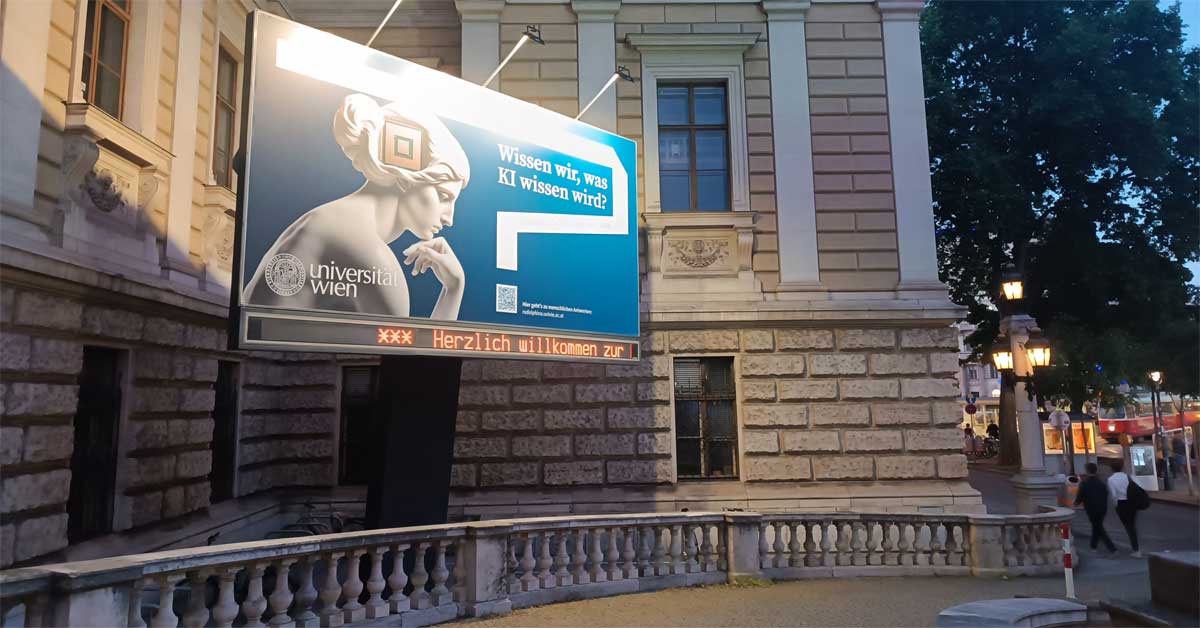14 May 2024
Vienna Insight: Fashion.at attended conversations about turning citizens into 'designers' of the future through active and competent use of digital technologies

AI, robots, and the impact of digital technologies on our societies, political landscapes, economies, and labor markets are evidently shaping contemporary discourses. The rapid evolution of new technologies is outpacing itself in increasingly shorter intervals. What was considered fast yesterday is now surpassed by even faster and more immersive advancements, such as the 4o iteration of ChatGPT, which astonishingly is - such as announced - accessible to all.
Over the next weeks, these capabilities will be rolled out, encompassing text, vision, and audio. Sam Altman writes on blog.samaltman.com about the journey toward to achieving human-level response times and expressiveness, heralding a significant paradigm shift. Altman states in his post, "We are a business and will find plenty of things to charge for, and that will help us provide free, outstanding AI service to (hopefully) billions of people."
In the video presentation, Mira Murati, Chief Technology Officer of OpenAI, mentioned the importance of safety and mitigations against misuse - Mira Murati emphasized the importance of collaboration across government, media, entertainment, and civil society to bring the technology to the world.
What is truly remarkable in the video is the real-time conversational speech with the chatbot with emotional expressions.
Today - by the way - Google's new AI extensions are eagerly awaited at the IO conference (io.google/2024).
Turning our attention back to Vienna. Fashion.at attended yesterday an event featuring talks and discussions that have become essential for those interested in actively designing the future. This involvement hinges more than ever on the exchange of knowledge, expectations, requirements, and hopes among the populace, scientific community, industry leaders, and policymakers. Transparency is seen as a necessity for the creation of a functional digital environment, and is crucial for exposing potential pitfalls such as biased information or fake news.
The event, entitled 'Empowering Citizens: Media Literacy & Democracy,' was the second in the 'U.S.-Austria Citizen Dialogue on Global Challenges' series. The event was organized by the U.S. Embassy in Austria in cooperation with the Austrian Federal Ministry for European and International Affairs. It was held at the Festsaal of the University of Vienna.
The speakers were both experts in the field of education. The first speaker, Michelle Ciulla Lipkin, Executive Director of NAMLE (National Association for Media Literacy Education), gave insights into her work to promote media literacy education in the US. One of the challenges she talked about was definitions such as 'fake news' and the problem that not all fake news is 100% fake, and how problematic it can be for people who don't have the knowledge to find sources, analyze them, and evaluate information to find out what's true. Media literacy also includes people's ability to actively communicate their opinions, desires or criticisms - to create and act using all forms of communication, as defined on namle.org/about.
Fake and truth were also the focus of the talk by media and technology philosopher Mark Coeckelbergh, professor at the Institute of Philosophy at the University of Vienna, who began his talk with the key themes of his book "Why AI Undermines Democracy and What To Do About It". The philosopher developed his thoughts on the future of democracy with detours into the history of philosophy to Plato - referring to the fact that steering a ship requires expertise - and the problem that many do not have the expertise to evaluate difficult circumstances. Expertise is an adjunct to literacy that opens up a new set of problems - who's going to determine what's true or false, as in the discussion of climate change.
The entire event, including the discussions, was live-streamed and can be accessed via YouTube.
The event concluded with the University of Vienna's semester question, "Do we know what AI will know?", which prompted speakers and audience members alike to reflect on the topics discussed that evening.
Image: Fashion.at captured an image of the poster displaying the semester question at the university's entrance. Articles and announcements related to AI events are regularly featured in 'Rudolphina,' the scientific magazine of the University of Vienna, on rudolphina.univie.ac.at/ki-wissen. |


